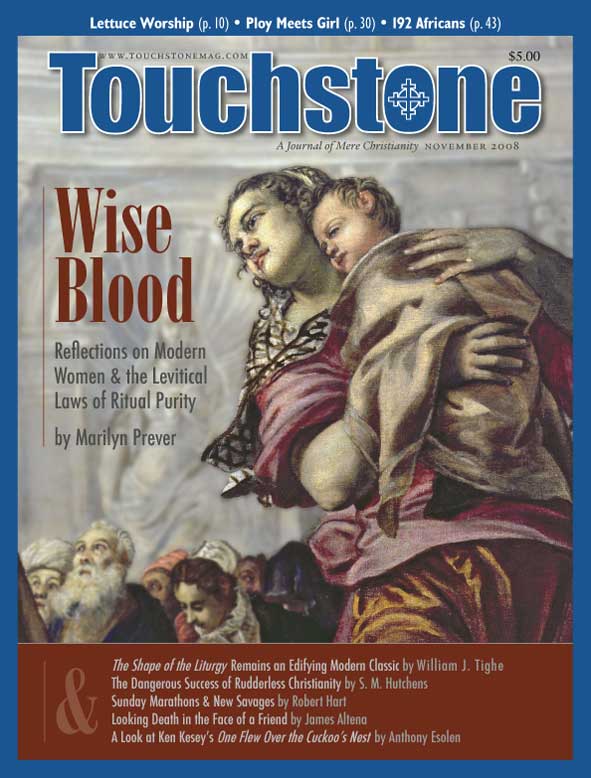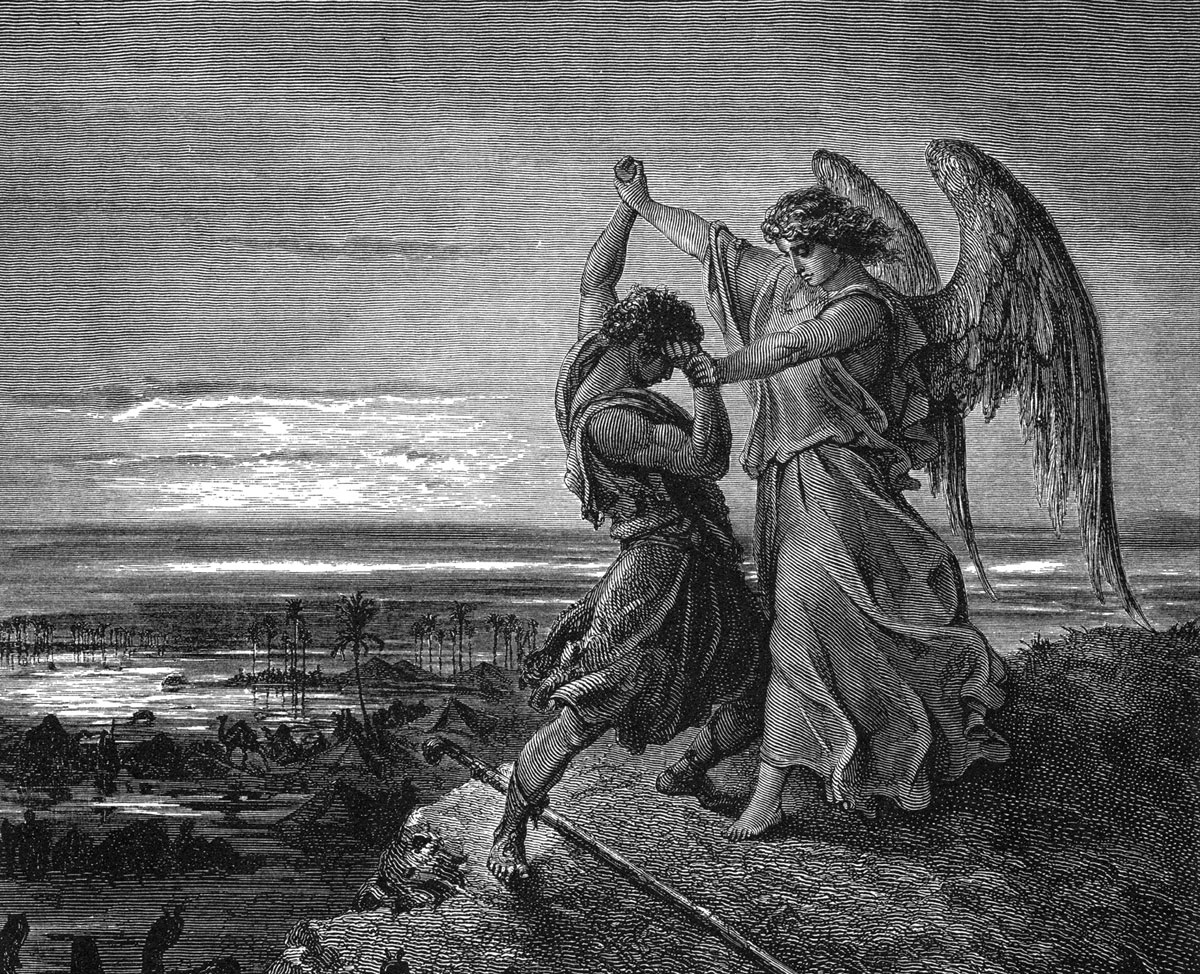Book Returns
The Beat Escape
Ken Kesey’s One Flew Over
the Cuckoo’s Nest
by Anthony Esolen
The Big Nurse glares at McMurphy, the one man strong enough to dismantle the order of her mental ward. “I hope you’re finally satisfied!” she cries. Puddles of booze and broken bottles litter the floor. Her usually spotless uniform is splashed with blood; a shy young man named Billy has cut his throat in terror that the Nurse will tell her “old friend” his mother how he lost his virginity with a trollop. “Playing with human lives—gambling with human lives—as if you thought yourself to be a God!”
But McMurphy, an inmate sent to the ward from the penitentiary, has had enough of that whited sepulcher, that orderly wickedness. He smashes the window of her cubicle and rushes upon her, throwing her to the ground and nearly choking her life out, until one of the black orderlies clubs him from behind. He will never speak again in this world. When he returns to the ward, stilt-legged and open-mouthed, he will be as gentle as a lamb, and the scar of a lobotomy will crease his forehead from temple to temple.
That is the climax of One Flew Over the Cuckoo’s Nest (1962), the first novel by Ken Kesey, hailed by many as a great new writer. His style was compared to that of the comic strip, with typically exaggerated masculine characters (Steve Canyon, Spiderman) bursting through the conventionalities of a necktied modern world to slam the evildoers and protect truth, justice, and the American Way.
People wrote straight-faced articles about whether a trip on LSD, which Kesey and his fellows among the Beats dabbled in, was akin to a mystical experience, breaking the bonds of “imperialist rationality.” Tom Wolfe called their movement a Neon Renaissance. Others wrote about the novel’s symbolism of the West, the last refuge of man’s freedom from civilization; a kind of dry-gulch Mississippi for long-legged Hucks and their black or Injun companions.
The novel was, in part, all these things. It was detested by the feminists, and not entirely without justice; its portraits of women are juvenile caricatures. Yet they also inveighed against it because, as one said, “it never once challenges the completely inhuman sexist structure of society.”
No, that it didn’t. And that, strangely enough, is a key to whatever enduring value the novel has. It did not challenge the traditional roles of the sexes; it accepted them as beautiful. It did challenge what Philip Rieff would call the “therapeutic society,” our soft, soulless world of half-men and half-women who cannot break free of their need for padding and pills and self-analysis. It is a cry for independence, not political but personal, from the bureaucratic tyranny of help.
Deeply Conservative
Cuckoo’s Nest is a good book, not a great book. Its dialogue strikes many false notes; sometimes McMurphy sounds as if he’s read Marcuse, and sometimes the chat of the inmates is motivated not by character but by Kesey’s need to push a point or advance the plot. Its symbolism teeters between the bold and the bombastic. Kesey never became a great writer, and LSD did not revolutionize the world, and free love has not knocked the chains from our feet.
But only a lapsed Catholic like Kesey could have written Cuckoo’s Nest, which, when you strip away the nonsense of the age, is deeply conservative, proclaiming the sacramentality of humble and elemental things: fishing on a river, the cold of an Oregon night, the warmth of the human body, the boldness of man and the tenderness of woman.
The plot is straightforward, related by one of the inmates, a schizophrenic Indian, “Chief” Bromden. Into the smoothly run mental ward, that boast of the “helping professions,” comes McMurphy. He is quick to note that the Big Nurse, the power in the place, has cowed the ineffectual doctors and has maneuvered the “Acute” patients into submissiveness and treachery, rewarding the men for revealing one another’s fears and falls. All of this occurs in the context of group discussion and “therapy” and “democracy.” The “Chronics,” as they are called by the nurses and doctors, or “vegetables,” as they are called by the malicious orderlies, are wrecks of men, strapped upright in the daytime with tubes mastic-taped to their organs, yet standing in puddles anyway. It is a place where cruelty enjoys the spice of benevolence.
McMurphy, with his “man smell of dust and dirt from the open fields,” comes to bring a new order, which is nothing more than a return to frank bodily life. His raciness and obscenity, and his infectious imagination, laughter, and play-acting, bring the men out of themselves. He joshes the mama’s boy, Billy, pretending that they two once picked up “two twitches” in Seattle. “Billy ‘Club’ Bibbitt, he was known in them days,” he laughs, and fascinates the men with an impromptu fantasy till finally he “slaps his leg and gooses Billy with his thumb till I think Billy will fall in a dead faint from blushing and grinning.”
He connives against the Nurse, winning a kindly doctor over and persuading him to lead a fishing expedition (with a T-shirted “friend” named Candy) out on the ocean. There he does not play the superhero—as he often does not, but lets the men play the heroes themselves:
Harding finally saw McMurphy wasn’t going to do anything, so he got the gaff and jerked my fish into the boat with a clean, graceful motion like he’s been boating fish all his life. He’s big as my leg, I thought, He’s bigger’n any fish we ever got at the falls. He’s springing all over the bottom of the boat like a rainbow gone wild!
Learning to Be Free
While everybody persuades the men that they need the protection of the ward, feeding their weakness and curing nobody, McMurphy, not for a moment blind to their eccentricities, can’t believe that they willingly stay: “I can understand it with some of these old guys on the ward. They’re nuts. But you, you’re not exactly the everyday man on the street, but you’re not nuts.”
McMurphy begins with the adolescent project of getting under the Nurse’s skin, setting up a casino in the game room to win all the men’s cigarettes and pocket change (and their admiration and allegiance), and turning the place upside down. When he learns, however, that he’s doing this at considerable risk to himself—that at any time he can be subjected to electroshock therapy or lobotomy at the will of the directors of the asylum—he broods about it and pulls back from his misbehavior. For a while, anyway. But there’s a wisdom that the world calls madness, and McMurphy finally puts himself in the way of destruction, so that the men will learn from his example to be men again, and to be free.
What is such freedom for? Kesey does not indulge in grand sociological schemes redolent of a faculty lounge. None of the men is interested in changing the world. The one whose mind we enter, the hallucinatory and silent Bromden, dreams of a good life on the banks of the Columbia, near The Dalles, where his people once had their dusty village, and where they kept body and soul together by fishing at the falls, till the white men came promising a hydroelectric dam and a lot of money.
Bromden’s father, the chief, one Tee Ah Millatoona, “Pine-That-Stands-Tallest-on-the-Mountain,” refused. He knew that the wealth—what little of it there would be—would ruin their way of life. But the white men worked on the women, on their fears, their desire for comfort; especially on the chief’s wife, a white woman who never took her husband’s name. Bromden was her name. “You’re the biggest by God fool,” she sneers, “if you think that a good Christian woman takes on a name like Tee Ah Millatoona.” The chief is forced to capitulate, and the last time his son sees him alive, he is an old and broken man, drunk in a ditch.
The feminist critic Marcia Falk fulminated: “This white woman’s singular unforgivable act was her refusal to take on her husband’s name!” That misses the point. Women, as Kesey saw it, were not an oppressed class, or were no more oppressed than anyone else. Instead, they happened to be ready to hand to use as the levers, not the only levers but still effective, whereby “The Combine,” the great bureaucratic machine of conformity, meaningless democratic forms without the substance of freedom, could manage men, whose unruliness and whose submission to their own structures of authority are threats to the all-competent state.
In this sense the Indian tribe near The Dalles is but the natural family, the self-sustaining neighborhood, the village with its elders, a church taking care of its own. The inmates’ fishing trip, too, is an example of a society doing something dangerous and difficult, something that demands obedience, yet that sets the heart free. Not all the Big Nurses in the world could have prevailed upon the men to do it—not least because it is in their interest to keep them manageable and helpless.
Sacrifice & Hope
In the end, McMurphy risks his life, attempting to defeat the Nurse in a way she cannot expect. He becomes the sacrificial Lamb, a man filled with vices yet strangely innocent, breaking the spell of therapy with sweat, bawdry, laughter, and heart, all things to all patients. After his lobotomy, the Indian “frees” him from the bonds of the asylum by pressing a pillow down upon his face, wrestling against that muscular body until the thrashing ceases. One of the men, understanding what is going on, asks the Indian (who has suddenly decided to speak again), “Is it finished?”—echoing Christ on the cross.
Then the Indian breaks out by wrenching the control panel in the tub-room from its wires and connections and heaving it through the windows, the glass splashing in the moon “like a bright cold water baptizing the sleeping earth.” He’s not the only one to escape. The kindly doctor turns in his resignation; the intellectual Harding signs out, and is picked up by the wife whose beauty had intimidated him; others sign out “Against Medical Advice.”
The novel ends with hope. That hope, I’ll add, seems wistful and implausible, as the therapeutic culture of social control is more firmly fixed in place now than when Kesey wrote. The Indian muses that before he flees to Canada he’d like to stop at The Dalles to see if any of the guys are left who haven’t “drunk themselves goofy.” He’s even heard “that some of the tribe have took to building their old ramshackle wood scaffolding all over that big million-dollar hydroelectric dam, and are spearing salmon in the spillway. I’d give something to see that.”
The teenager in me would like to see that, too, Chief Bromden. But the sexual revolution and the irresponsibility that your author accepted never did bring the freedom he sought. We never needed a new Christ, laughing and card-sharping and dialing up hookers. We needed the only Christ, and we still need him, the Christ of old, and ever new.
Anthony Esolen is Distinguished Professor of Humanities at Thales College and the author of over 30 books, including Real Music: A Guide to the Timeless Hymns of the Church (Tan, with a CD), Out of the Ashes: Rebuilding American Culture (Regnery), and The Hundredfold: Songs for the Lord (Ignatius). He has also translated Dante’s Divine Comedy (Random House) and, with his wife Debra, publishes the web magazine Word and Song (anthonyesolen.substack.com). He is a senior editor of Touchstone.
subscription options
Order
Print/Online Subscription

Get six issues (one year) of Touchstone PLUS full online access including pdf downloads for only $39.95. That's only $3.34 per month!
Order
Online Only
Subscription

Get a one-year full-access subscription to the Touchstone online archives for only $19.95. That's only $1.66 per month!
bulk subscriptions
Order Touchstone subscriptions in bulk and save $10 per sub! Each subscription includes 6 issues of Touchstone plus full online access to touchstonemag.com—including archives, videos, and pdf downloads of recent issues for only $29.95 each! Great for churches or study groups.
Transactions will be processed on a secure server.
more from the online archives
calling all readers
Please Donate
"There are magazines worth reading but few worth saving . . . Touchstone is just such a magazine."
—Alice von Hildebrand
"Here we do not concede one square millimeter of territory to falsehood, folly, contemporary sentimentality, or fashion. We speak the truth, and let God be our judge. . . . Touchstone is the one committedly Christian conservative journal."
—Anthony Esolen, Touchstone senior editor









